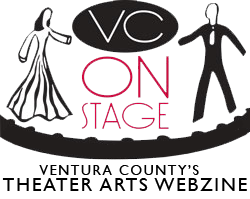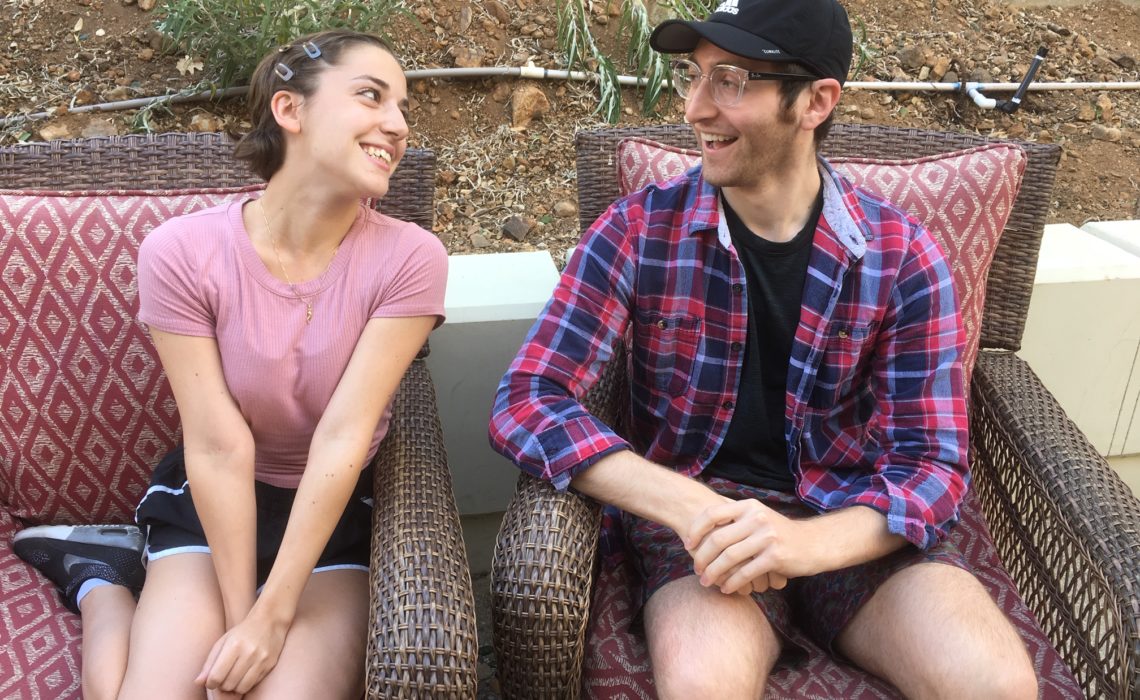In 5-Star Theatricals’ current production of Meredith Willson’s The Music Man, acrobatics worthy of an Olympics gymnastic meet are turned in nightly by Antonia Vivino, who plays starry-eyed teen Zaneeta Shinn, “the mayor’s oldest girl,” and Adam Winer as Tommy Djilas, “the wild kid” who lives on “the wrong side of town.” The pairing of Zaneeta and Tommy, with their cries of “Ye Gods!” and “Jeely kly!” are supposed to typify the personalities of Iowa teenhood in 1912, with their exuberance, innocence and mutual infatuation. Vivino and Winer are both seasoned performers, despite their young age. Vivino was recently featured as Anybodys in 5-Star’s production of West Side Story, while Winer is coming off a multiyear run as Dr. Wheelgood in American Repertory Theatre’s The Donkey Show. We sat down with Antonia and Adam before one of their exhaustive but fun rehearsals for their roles in The Music Man.
VCOS: One thing I love in The Music Man are the colorful names of its characters. Did you ever wonder about the names and where they came from?
ADAM: We’ve actually been getting emails about the history behind each of them. Every day at rehearsal, we get a special note from Larry Raben, our director.
ANTONIA: Our most recent one had to do with Harold Hill. We haven’t gotten anything yet about our own characters’ names yet, but I believe it had to do with how he got his name, that it came from a childhood friend of Meredith Willson’s, so that’s how they figured they’d incorporate it.
VCOS: Is there any kind of a back story for Zaneeta and Tommy?
ANTONIA: I like to always think of back stories, just for fun, even if it’s the tiniest character. But I like to think of Zaneeta specifically as your stereotypical 1912 goody-two-shoes, by-the-rules, by-the-book girl. But she has this slight rebellious side that Tommy brings out in her. She’s scared of her dad. Anything that she does that is not within the circle of what she’s supposed to do is completely out of the question and not allowed. And she’s already broken several of those rules and I feel she leans more towards her mother because she’s more lenient. But she feels very isolated and kind of trapped in her own little bubble and that’s why she’s drawn to Tommy because he’s the complete opposite of that.
VCOS: Is Tommy really from the “wrong side of town”?
ADAM: He comes from a different part of River City where his dad is a lower class factory worker, not like the posh, nose-in-the-air “River Citizians,” as Mayor Shinn says. He’s not as respected as the store owners and the businessmen in town. So they see Tommy’s family as less than successful.
VCOS: I know that The Music Man was not written as a moral lesson about social class but there is an underlying commentary about Tommy and the view of the Mayor and the others towards him and his family. River City would also be a town where blacks do not own businesses so how has Broadway helped change The Music Man?
ADAM: I feel that it’s always good when casts are diversified because there are more diversified audiences than there used to be. It’s always helpful when future generations of performers and theater lovers see people who look like them on stage, so we do have other ethnicities represented in the cast.
ANTONIA: Our director, Larry, does, however, keep the classic story alive without changing anything about it. So the social class distinctions are still very much in the picture.
ADAM: The second song in the show is “Iowa Stubborn,” which is basically their way of saying, this is our way of life, we’re the upper-middle-class for that area and they probably don’t even know what’s going on in the rest of the world, but they think that whatever they’re doing is right.
ANTONIA: And even within their world there are separate classes, like the mayor is above everyone else in town.
VCOS: I get the impression that “Iowa Stubborn” represents the politically conservative faction of the town, where they don’t want anything new and they resist any changes to their stability, and then all of a sudden, here comes something new to disrupt the whole town. Antonia, you’re just coming off playing Anybodys in West Side Story, which is about a 180 degree turn from Zaneeta. Is there anything similar between the two characters that you’ve been able to draw from?
ANTONIA: Similar? Oh my gosh! I want to say that they both discover and pursue what they want to be a part of. Anybodys is rambunctious and doesn’t care what anyone thinks of her, whereas Zaneeta does care what people think of her but at the same time she eventually wants to branch out into a more free will state, so I think that in the end, both Anybodys and Zaneeta find their sense of power to do what they want.
VCOS: I feel that both characters are in a situation where they strive to be someone they are not. Anybodys wants to be part of the Jets and Zaneeta is a young girl who wants to be treated like an adult and have adults’ rights.
ANTONIA: Yes. Anybodys wanted to be a Jet and wanted to be included but I came up with a whole other back story for her that isn’t even written into the show, but again, I like to take any role that I play and come up with any sort of back story so I could play off of that so I can give it my own clarity. But, you’re right, both she and Zaneeta want to be somebody they’re not. As much as Zaneeta has been trained to be a “proper girl,” she’s like Anybodys in that she doesn’t want to be a girl – in different ways, of course. Zaneeta isn’t a tomboy but she wants to be a woman.
VCOS: How about Tommy? Is there any point of reference you found with other characters you’ve played?
ADAM: Not really. This one’s a little new for me. I think it’s funny because the way River City treats Tommy as the town’s ruffian, in our day and age, we would see him as fairly non-problematic.
VCOS: Well, he does set off firecrackers in public places.
ADAM: Totally! (laughs) But I love the direction playing him is taking me and opening up that aspect of myself.
VCOS: Have you two done much studying up on all the cultural references in the script?
ANTONIA: I feel that Larry has done a great job in rehearsals in immediately explaining things that come up. But personally, I like to think about this time being the year of the Titanic and comparing it to people in the movie. Like I go to it and think about the class distinctions of that time, the way they dressed and the way they presented themselves. Everyone had a certain way of walking, it was very, very specific. But more than anything, I’ve looked at mannerisms, how people presented themselves as the historic examples of the time.
ADAM: Two things that stick out for me are the Wells Fargo wagon, which was a really big deal in River City and all the specific items they had received. And also, the styles of music throughout the show. For me, the biggest one is “Marian the Librarian,” the song that Harold sings in the library, which has this jazzier beat than the songs in the rest of the show.
VCOS: I recognized that intro from “Cow Cow Boogie” by Ella Mae Morse, which was from the early 1940s, so yes, I agree that that song did have a modern, jazzier tinge to it. But when you perform in The Music Man, you’re being put into a world that is over a hundred years ago, not just time-wise but culturally as well. But as you get to know the script and the characters, do you begin to recognize more similarities than differences?
ANTONIA: It’s funny you bring that up because I always like to try and find what’s relevant to what’s going on today in classic musicals and this has been a tricky one. But this town feels very secure in what they know and today we feel the same way, being comfortable in what we know and what we do. In our society, we’re exploring new technology and continuing to grow yet we’ve become comfortable with our cellphones and social media. But it continues to grow.
VCOS: And Harold Hill represents a threat to that comfort zone with the change that he brings.
ADAM: I see some political things that are similar, like the mayor.
VCOS: Yes, he’s such a doofus and the members of the school board are kind of like his own personal cabinet of yes-men that do his bidding. That view of politics really hasn’t changed much. But what about Harold Hill? He serves in the show as a unifier, getting the citizens to work together on a common goal, meaning the boys band.
ADAM: You have to create an “other” to get everyone else to work together.
VCOS: And there’s also the language of that time. Both of your characters use catchphrases which were the “awesome” of its day.
ANTONIA: Yes, Zaneeta saying “Ye Gods!” all the time reminds me of Mean Girls and the things that they say in that movie.
VCOS: That’s what makes The Music Man such a universal show, the more things change, the more they stay the same. So no matter what generation you’re in, you see something that reminds you of behavior you witness in your own time. For me, it was “groovy” or “rad.” But it exists for every generation.
ANTONIA: Right!
VCOS: Tell me about the dancing you’ve had to learn.
ADAM: We are DANCING!
ANTONIA: Non-stop.
ADAM: Our choreographer, Peggy Hickey, knows what she’s doing, she’s done this show a bunch of times, and I think this is one of the danciest versions of The Music Man that you will ever see.
ANTONIA: I went into this show knowing I was going to dance, but I didn’t know I was going to DANCE. It’s a very physical show. We have to make sure that we stay in shape and keep our muscles warm because there is so much every day that we have to do. It’s very demanding on the body. Even though she’s done it so many times, Peggy told us that she does it differently every time, because she’s using new people every time. But it’s so well done, especially in “Marian the Librarian,” which is my personal favorite. It has so much going on, but not to the point where it becomes chaotic. There’s actually a lot of story telling going on.
ADAM: It’s almost a ten-minute scene and through movement, Marian and Harold’s relationship changes as well as the relationships between the ensemble members.
ANTONIA: I’ve done a lot of ballets and Nutcrackers, but I have moments where I feel like I’m back in ballet school, even though this is a musical. But I have such a great time because I feel like I’m telling a story in a different light because this is a musical. It’s hard to explain, but it feel so different from other musicals that have involved dance. Every other production of The Music Man that I’ve seen doesn’t have the dancing that this one does.
ADAM: We do something while we’re holding a Romeo and Juliet book, so you can see how our relationship is developing, but later, Harold and Marian mimic the movement we made while we are mimicking their relationship.
VCOS: Are you learning period moves and dance steps from that time?
ADAM: Yeah! Peggy has their own names for them.
ANTONIA: There’s a move that she calls “the washing machine” but it’s really just a grapevine in a circle with partners. They basically do grapevines while holding onto each other while going in a circle, but she calls it a washing machine because it almost looks like the back-and-forth motion of a washing machine.
ADAM: And we do polkas and waltzes.
VCOS: And the shipoopi, whatever that is.
ADAM: And there’s an iconic shipoopi step that we do, too.
ANTONIA: All of the high energy polka dancing is in that number. That one is the most tiring one that we do.
VCOS: I’m pretty sure Willson made that up. There was no shipoopi, but he makes you believe there was.
ADAM: Right!
VCOS: Well, I wish you both the best of luck, don’t break legs, and just have fun.
ANTONIA: What’s really great about this show is that it’s the 25th anniversary of the Civic Arts Plaza and the first show 5-Star did in this building, back when it was Cabrillo Music Theatre, was The Music Man. So that’s why we’re doing it. But the other thing that’s special about it is that the rights of the show are being frozen after we finish because there’s going to be a Broadway revival with Hugh Jackman.
ADAM: And we met Shirley Jones, who came to a rehearsal.
VCOS: Did she say anything to you?
ADAM: Yeah, she answered some questions and was very elegant.
ANTONIA: And our Winthrop and our Marian got to perform for her. And we did “Trouble” for her. That was so cool!
*******************
The Music Man concludes its run at the Kavli Theatre October 27. For dates and showtimes, see the VC On Stage Calendar.







No Comments